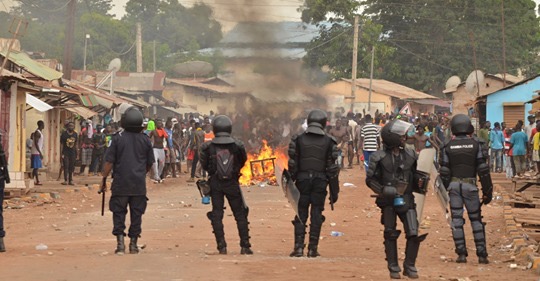
Pursuant to the 1997 Constitution, the State, including the police, have a fundamental duty to observe, respect, protect, promote and fulfill the rights and fundamental freedoms of every Gambian.
Law enforcement agents are the most visible manifestation and embodiment of Government authority. To attack them is to invite lawlessness and anarchy.
Under anarchy, there is nothing to forestall evil people from committing heinous acts such as murder, theft and rape.
Within any state, including the Gambia, the police are needed for the prevention and detection of crime, maintenance of public order, traffic control and assisting the public.
Anybody who attacks our law enforcement agents is deemed an agent of anarchy. These forces, especially the police force, have a history of bestiality and brutality.
They also have a history of faults, repression, coercion, and intimidation—all used in maintaining the status quo and protecting the establishment.
There has been a recent trend where civilians have, for one reason or another, felt justified to attack law enforcement agents on duty. There were those who saw it as an empowering moment where a citizen was reacted to an oppressive system. Others saw it as a serious affront to the rule of law.
No matter the justification, there should be other avenues instead of attacking security officers. There should be effective complaints and redress mechanisms that aggrieved civilians can use to channel their grievances and seek justice whenever they feel wronged by the police.
When our combined security forces wantonly attack unarmed and defenceless civilians, we strongly condemn this brutality.
However, when civilians attack the police and other combined forces, these actions are considered a moral catastrophe and a prelude for disaster. The main point is that we don’t want to live in a police state, but instead a democratic and free Gambia.
Any security officer who extra-judicially attacks a citizen or uses unreasonable force is a criminal and should be reprimanded. Along the same line, citizen or affiliate of a party who attacks our combined security forces is a criminal and must be punished.
Systemic challenges notwithstanding, it should always be remembered that not all officers are bad. In the fulfillment of their duties, police may sometimes resort to force and firearms, arrest and detention, search and seizure.
Because of their proximity to citizens and their potential to curtail citizen’s rights, police officers as a matter of necessity must be adequately trained and equipped to ensure that they do not abuse these powers. They must have the temperament and good judgment in how they interact with civilians as they do their job.
When exercising these powers, they must comply with the law, including practicing restraint and using legal force only when it is necessary and proportionate.
Although these recurring police brutality might cause feelings of hopelessness and helplessness among our citizenry, we must remain resolute in our spirit, thoughts, and prayers.
We must continue to constructively push our government and combined security forces to stop these acts of unbelievable police brutality. These men and women in uniforms who engage in this brutality need to change and support the Gambian people.
Two and half decades of police brutality in the Gambia still have lasting effects. What started as localised police brutality metamorphosed into an epidemic in Brikama, Faraba, Kanilai, Yundum, and in Serekunda, full-blown police banditry, and finally a standing armed security of terrorists at their epicentre in the Greater Banjul Area.
The government needs to introduce a new kind of politics or policies in ethical policing while maximizing the use of diplomacy, political and cultural reconciliation, preventive security, and economic intervention to constrain and neutralize aggressors, resolve the causes of bitterness, and provide better conditions for a just and lasting peace.
To make this peace possible, we need new leaders, and elders who will tell the truth about this political violence and crises and work to guide our country onto a new path.
We want peace and security and prosperity in the Gambia, and now is the time for a new and innovative approach and community policing based on security reforms.
The government needs smarter diplomacy to deal with the political crises, as well as to cope with the current troubles in its relations with the people.
It must apply a smarter diplomacy and seek alternative ways to deal with situations if the first option does not offer a credible opportunity. We cannot wait for a situation to change; instead, we must invoke different diplomatic options to create a new Gambia.
Our combined security forces are too heavy-handed. Their use of force and bravado is not necessary. These forces should learn to use a gentler and smarter power.
Policing is an art dependent on good interpersonal relationships and negotiations. These are skills that, when deployed tactfully, have reliable results.
No person with a weapon can harass and intimidate unarmed civilians. The fact that you have teargas canisters does not mean you have to use them.
Most problems have more than one solution, so do not use excessive force. Choose the alternative, which is to apply due processes of law.
Our government along with our men and women in uniform must remain resolute and determined. They must have moral superiority and not just the advantage of strength. Many in our security forces have made sacrifices, even supreme sacrifices, to keep our country safe. We must identify them and support them.
This current and implacable evil must be defeated. We will either defeat it, or it will defeat us by drowning our country in blood and compelling us to accept the barbarism of anarchy.
We should therefore transform to a situation where the need for the police to resort to limiting civilians’ rights is dictated by the law, pursues a legitimate aim of protecting life and maintaining order.
Images of police officers lowering the dignity of Gambians, who are essentially their clients, bosses or even employers, such as brutal beatings and humiliation should be a thing of the past.
May the Good Lord accept the souls of the dead after all of these years of police brutality, heal the injured, wipe the tears of the grieving, and comfort the living. May God bless Gambia.
By Alagi Yorro Jallow











Recent Comments